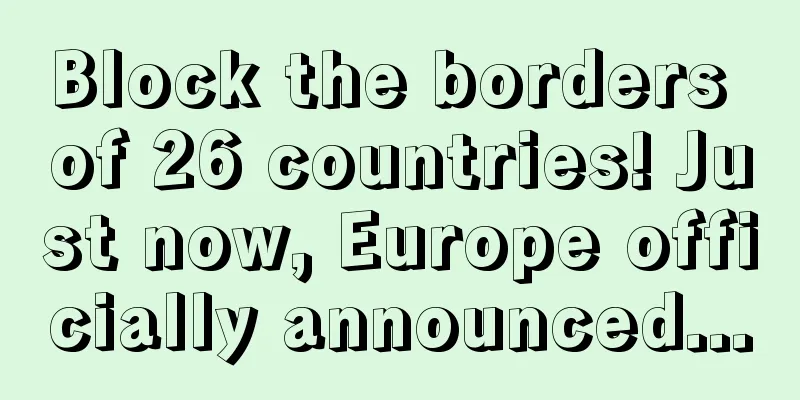Block the borders of 26 countries! Just now, Europe officially announced...

|
The international epidemic situation is becoming increasingly severe, and it is causing a serious blow to logistics, which is extremely deadly to Europe! As of 16:00 Central European Time on the 17th, the global total number of confirmed cases of COVID-19 has reached 184,976, with 7,529 deaths, and 159 countries and regions have reported cases. Under the red alert for the epidemic, many European countries have implemented border controls and adopted strict travel restrictions. Denmark announced full or partial closures of air, ferry and rail transport; Austria announced the suspension of flights with Spain, France and Switzerland; Poland announced the suspension of all cross-border air, rail and road traffic; The Czech Republic announced that it will ban entry of foreign citizens without residence permits from the 16th; Slovakia announced a ban on entry of foreign citizens without residence permits; Cyprus announced that it would ban foreign citizens from entering the country for 15 days starting from the 15th. Recently, Europe announced another important policy - closing the European Schengen area border for 30 days! At 8 p.m. local time on the 16th, French President Macron delivered a televised speech, announcing that France will enter a nationwide restriction on the movement of people at noon on the 17th, and the measure will last for 15 days! Macron also announced that, based on the recommendations of the European Commission, the border between the EU and the Schengen area will be closed at noon on the 17th, and all travel between non-EU countries and EU countries will be suspended for 30 days! What are Schengen borders? Schengen countries refer to the member states that have joined the Schengen Agreement (Schengen Convention). On June 14, 1985, France, Germany, the Netherlands, Belgium and Luxembourg signed the Schengen Agreement in the small town of Schengen in Luxembourg. The agreement stipulates that the countries will cancel border checkpoints between each other and coordinate border controls outside the Schengen area. That is to say, for international travelers, this area is very much like a separate country, with almost no border controls between countries within the region and free entry and exit. There are 26 Schengen member states to date, including: France, Germany, Austria, Switzerland, Italy, Netherlands, Belgium, Luxembourg, Denmark, Norway, Sweden, Finland, Iceland, Spain, Portugal, Greece, Lithuania, Latvia, Estonia, Poland, Hungary, Czech Republic, Slovakia, Slovenia, Malta and Liechtenstein. Before the implementation of the Schengen Agreement, most of the borders of European countries were patrolled and equipped with a large network of border checkpoints to check the identity and authorization of citizens traveling between countries. After the implementation of the Schengen Agreement, border checkpoints between Schengen countries were closed and most of them were removed. According to the relevant provisions of the Schengen Borders Code, all obstacles need to be removed between member states to ensure smooth traffic at internal borders. Therefore, when passengers travel between Schengen countries by water, land and air, they no longer need to be checked by border guards! It can be said that it greatly facilitates the travel of people from European countries! However, if the Schengen member states are threatened by public policy and internal security, they have the right to temporarily restore border controls with other Schengen countries. When some foreseeable activities may bring potential risks, the countries involved must notify the European Commission in advance and discuss with other member states. Sellers face shortage of stock The closure of the Schengen area due to the pandemic is unprecedented. It can be said that Europe is moving from the era of bulk shipments to the era of bulk shipments! Among them, European logistics may be deeply affected! With the closure of the Schengen border, flights to and from Europe may be further reduced, deepening the recession in the air transport industry! In addition, due to border inspections, the flow of people and goods between countries may be slower, and logistics timeliness and prices will become more uncontrollable! Recently, it has been a double whammy for cross-border sellers! Just yesterday, Amazon announced that it would stop accepting non-essential products from FBA, and some FBA sellers are in trouble! With the European border inspection, overseas warehouses and self-delivery may also be affected... It can be predicted that the out-of-stock trend is not far away for most people, so sellers need to prepare as soon as possible! |
>>: How to make $3,000 a day by developing a hit product for Amazon!
Recommend
Analyzing Amazon Brand Analytics: A must-have for brand sellers
Brand Analytics is one of the features provided by...
Is the advertising effect good during the peak season? Sellers should pay attention to these points
During the peak season, sellers have to run Facebo...
What is Cdiscount? Cdiscount Review
Cdiscount is currently the largest local e-commerc...
Sellers are going to cry! Just now, Amazon’s claim policy has changed dramatically!
0 1 Amazon adjusts A-to-Z claims policy Amazon re...
What is Shuaishou.com? Shuaishou.com Review
Shuaishou.com provides sellers with tips on how to...
What is Global Store Seller Transformation Consulting? Global Store Seller Transformation Consulting Review
Transformation consulting for global store sellers...
What is Dafiti? Dafiti Review
Dafiti is a leading online fashion retailer in Bra...
From a loss of 2.7 billion to a loss of nearly 300 million, Youkeshu gradually emerged from the shadow of account suspension
In early January, foreign media reported that Amaz...
Wayfair launches paid membership program Wayfair Rewards
It is learned that on October 22, according to for...
What is ShopAtHome.com? ShopAtHome.com Review
ShopAtHome.com is a famous discount coupon website...
Six black technologies to increase the clicks on your Facebook post links
Facebook is one of the main marketing platforms fo...
What is the Eurasian Patent Office (EAPO)? Eurasian Patent Office (EAPO) Review
The Eurasian Patent Organization (EAPO) is an inte...
Amazon new product promotion process
Amazon new product promotion process...
The US$1,400 bailout funds have been arriving in batches. Have you, a cross-border e-commerce merchant, seen a surge in orders?
U.S. President Joe Biden signed the American Rescu...
What is Buyer.com? Buyer.com Review
Buyer.com strives to provide an online interactive...









